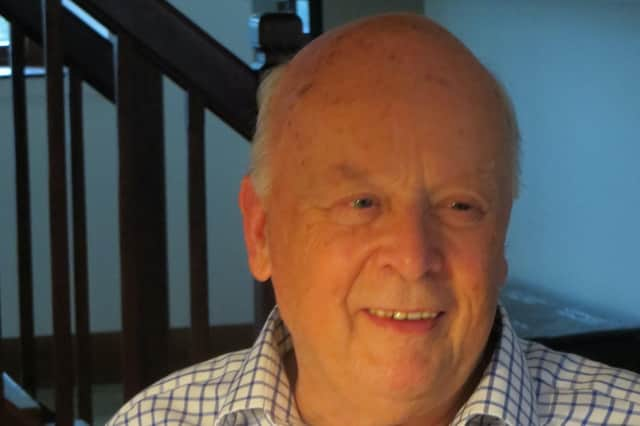Scotsman Obituaries: Professor George Stewart, academic and petroleum engineer


Professor George Stewart was born in Edinburgh in 1940. His father, also George, was a lifelong employee of the Bank of Scotland, and his mother, Elizabeth, was a former teacher. He was the oldest of three brothers, all of whom attended George Heriot’s School in Edinburgh.
George was an able pupil, with many interests, including science, and in 1958 he gained entry to Edinburgh University to study Chemical Engineering, where he was awarded a first class honours degree in 1962.
Advertisement
Hide AdAdvertisement
Hide AdAfter graduation he worked as a process engineer at the Esso oil refinery in Fawley, Hampshire. In 1963 he moved into the academic world as an assistant lecturer in chemical engineering at the University of Newcastle, where he studied for a PhD i n chemical engineering.
In 1967 George moved north for a senior lecturer position at Heriot-Watt University in Edinburgh, becoming a founder member of the chemical engineering department. In 1975 he moved to the nascent department of petroleum engineering with Prof Jim Brown, Bou van Oort, Adrian Todd and Andrew Tweedie.
After nine years at Heriot-Watt he took a sabbatical, becoming visiting professor of petroleum engineering at the University of Texas at Austin (1976-78). He spent four further sabbatical years in Paris as senior research engineer with the French oilfield service company Schlumberger (1978-82). Schlumberger used “wire” technology to assess oil deposits and George became very interested in this technology. He returned to Heriot-Watt as a professor and head of the department of petroleum engineering. The department was acquiring an international reputation for both research and teaching; a number of Americans came to Edinburgh on sabbaticals.
Under his directorship, the Department of Petroleum Engineering received a Queen’s Anniversary Prize for Education in 1994. The University secured £3.6 million from the international oil industry for large-scale research programmes in 1993.
The department ran a Masters degree in petroleum engineering, which came to attract top engineers from industry, many of whom later progressed rapidly in their careers. For five years he was head of the department, but as he was not perhaps a natural administrator, he relinquished this role in 1987, while continuing as professor until his retirement from academia in 2013 at the age of 73.
George was made Honorary Doctor of Engineering by Heriot-Watt in 2017. He was an external examiner at Imperial College London, and an assessor for Commonwealth and Rhodes scholarships.
In 1984, with others, George founded the spin-out company Edinburgh Petroleum Services Ltd (EPS) to market software written by the department, and to provide oil reservoir consultancy and training to industry. Among many other products, the software programmes PanOil and PanGas – the first real attempts to computerise well investigation – were major sellers. Other software and inventions followed. He was chairman of EPS from 1987 until its takeover in 2012 by the large US oilfield service company, Weatherford. The Americans then snapped him up and he became their chief reservoir engineer, first in the USA and later in Kuala Lumpur, Malaysia. George finally “retired” in 2019, at the age of 79.
He was a world-class oilfield reservoir engineer, frequently consulted by industry on oil and gas-field problems in the North Sea and worldwide. As a young senior lecturer he wrote a report for the UK Department of Energy entitled “Enhanced Oil Recovery”, and later sat on the UK Department of Energy Committee on Enhanced Oil Recovery. George published countless scientific papers and two authoritative textbooks on the testing and assessment of oil wells. In the world of reservoir oil and gas engineering, and in particular in well test analysis, he was a major innovator.
Advertisement
Hide AdAdvertisement
Hide AdGeorge was a colourful character with multiple personal skills which were invaluable in his varied career. He was a natural leader, highly intelligent, forward-looking, enthusiastic, inspiring and supportive of his staff. He was naturally gregarious and an excellent communicator. The clarity and humour in his lectures and end-of-course dinners were legendary. He is fondly remembered by hundreds of engineers as a leading light and an inspiring mentor in their careers. His mathematical skills were of immense value both in academia and industry.
George was an athlete. At Heriot’s he was in the school tennis team and was an enthusiastic member of Waverley Tennis Club in Edinburgh – he spurned the family sport of golf “because there weren’t enough girls”. In later life, he turned to squash, where he likewise excelled. Many a student tried to beat him at squash but only one actually succeeded. In hobbies, he enjoyed books (he had a large library, with much Walter Scott), ballet, especially at the Royal Opera House in Covent Garden, good food and wine, and animated discussions around his table.
He was married twice, firstly to Valerie (nee Aitchison) with whom he had two sons, Ewen and Niall, who survive him, and then to Dorothy (nee Hogg), who lovingly and diligently cared for him in his final weeks. She survives him, as do her sons James and Robin from her previous marriage, and their six delightful children.
At the end, diagnosed with widespread cancer, he faced this most testing life event with characteristic courage, fortitude and cheerfulness, enjoying multiple visits from friends, colleagues and family, looking back on a varied, interesting and enjoyable life in which he had contributed professionally, socially and in the family. He will be missed by many people.
Obituaries
If you would like to submit an obituary (800-1000 words preferred, with jpeg image), or have a suggestion for a subject, contact [email protected]
Subscribe
Subscribe at www.scotsman.com/subscriptions